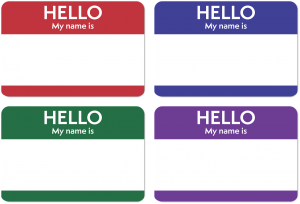I just discovered this semester that I’ve been doing something wrong–or at least not very right–for a long time.
First day of class roll call always involves a bit of awkwardness as I’m learning to pronounce people’s names, particularly as the number of naming cultures in this country grows and as naming conventions become less and less standardized in general.
Having once been in class with an undergrad professor who was less gracious about this than he thought he was (whose “Oh, what kind of name is that?” was meant to be welcoming but instead marked people out as different), I have tried to handle this as smoothly and respectfully as possible.
I’ve always said, “If I’m mispronouncing your name, please correct me. I want to get it right. Even if it’s a little embarrassing, please correct me.”

Well.
Then I met Kenyatta, a salesperson in a woman’s clothing store.
She did the usual, “I’ve opened up changing room six for you, and if you need any help, my name is Kenyatta.”
I said, “Ooo, like the statesman?”
She said, surprised, “Yes, that’s who I was named after. Um, I usually have to tell people it rhymes with pinata.”
Okay, NO.
I told her I thought she deserved better, and she seemed appreciative.
(I don’t think she’s going to start saying, “Like the first president of independent Kenya? Don’t you KNOW who that is?” But, gosh darn it, maybe she should.)
As soon as I put it that way, I realized that I hadn’t really been all that much more gracious than that undergrad professor I remembered. “Even if it’s embarrassing, correct me” put the responsibility on the student with the unconventional name. “Even if it’s embarrassing” told all my students that there might be a reason to be embarrassed about correcting your professor. “I want to get it right” told my students that I was just. so. special. because I wanted to learn their unconventional names. My effort to say something respectful actually made it sound like I was extending an extra, rather than a standard, courtesy.
Okay, so, NO. That script needed a change.
This year, for roll call: “My apologies if I mispronounce it the first time. Please let me know the correct pronunciation. You deserve to have your name pronounced correctly.”
This language emphasized my responsibility–to do right by them–rather than theirs. This language emphasized a universal standard–we all owe this to each other–rather than my super-special-niceness toward some poor “different” kid. This language equalized and normalized what might otherwise have been singled out and made exceptional.
I don’t know how much difference it will make to my students, but it makes a difference to me. I think I did my job better with that tiny change of emphasis. I think I told my students more clearly that college-educated folk learn to pronounce each others’ names. That’s just what we do.
Teachers at the beginning of the school year aren’t the only people who set the tone in this way and who might do their jobs better in this way.
HR folks, section leaders, orientation directors, managers, bosses, employers of all sorts can communicate expectations, foster a culture of equality, and welcome new employees well when they handle unfamiliar names appropriately.
Allowing some room for regional accents, we can, in general, learn to pronounce people’s names correctly, no matter what naming cultures we or they come from. And we can, in our language about our own learning curve, acknowledge whose responsibility the learning is.
“I can tell I’m not getting it quite right. Can you help me again?”
Not “What is it again? It’s hard.”
Or, “I’m so bad with ethnic names. What is it again?”
“Friends, let me introduce [pause] [name pronounced correctly, slowly]. She will be working with you on [job-related thing]. Please welcome [name pronounced correctly, at normal speed] and orient her to our project.”
Not “All right guys, here’s your new co-worker [name pronounced fast and slightly wrong]. Make her feel welcome. Try to learn her name right. [hearty guffaw]”
“No, don’t apologize. I’ve learned to pronounce Socrates and Beethoven and Krzyzewski and Keanu. I can learn Damrithamanij. Don’t let me off the hook on this.”
Not, “That doesn’t sound how it’s spelled. What kind of name is that, anyway?”
“I’m sorry. I was saying it wrong because we have another employee with the same spelling whose name is de HAY-zoos. I will remember from now on that your name is de hay-SOOS.”
Not,”Oh, I’ll try to remember that you pronounce it differently than the other De Jesus I know.”
Or, “Oh. That’s not how Jorge in Accounting pronounces it. Why is yours different?”
And never, ever, EVER, “I’m just going to call you [nickname I made up].”












